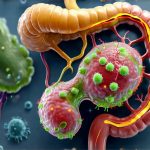The intricate relationship between our environment and internal health is becoming increasingly apparent, with emerging research highlighting the profound impact of air quality on aspects far beyond respiratory function. For decades, we’ve understood that polluted air damages lungs and contributes to cardiovascular disease, but a growing body of evidence reveals a surprising connection: the gut microbiome. This complex ecosystem within us, comprised of trillions of bacteria, fungi, viruses, and other microorganisms, plays a critical role in digestion, immunity, mental health, and overall well-being. Disruptions to its delicate balance – dysbiosis – have been linked to numerous chronic diseases. Now, scientists are uncovering how exposure to airborne pollutants and toxins can directly influence the composition and function of this vital microbial community.
The mechanisms through which air pollution affects the gut aren’t straightforward; it’s not merely about inhaling particles that directly colonize the intestines. Instead, a complex interplay of factors is at play, involving immune system modulation, altered intestinal barrier permeability (“leaky gut”), and direct chemical interactions with gut microbes themselves. These effects can cascade through the body, impacting systemic health in ways we’re only beginning to understand. This article will explore the emerging science detailing how air quality, pollution, and environmental toxins influence gut microbiome balance, examining specific pollutants, potential consequences, and avenues for mitigation – all while emphasizing that this is a rapidly evolving field of research.
Air Pollutants & The Gut Microbiome: A Direct Connection
The types of air pollutants we’re exposed to are diverse, ranging from particulate matter (PM2.5 and PM10) originating from combustion sources like traffic and industrial processes, to gaseous pollutants such as ozone, nitrogen dioxide, and sulfur dioxide. Even seemingly innocuous things like pollen can contribute to inflammation that impacts gut health. Recent studies have demonstrated a direct link between exposure to these pollutants and alterations in the gut microbiome composition. For example, research has shown that chronic exposure to PM2.5 is associated with decreased microbial diversity – a hallmark of an unhealthy gut – as well as specific shifts in bacterial populations.
Specifically, several studies indicate a reduction in beneficial bacteria like Faecalibacterium prausnitzii and Bifidobacterium, while simultaneously observing increases in potentially harmful species. This imbalance can have far-reaching consequences. A diminished presence of butyrate-producing bacteria (like F. prausnitzii) leads to reduced levels of butyrate, a short-chain fatty acid essential for maintaining gut barrier integrity, reducing inflammation and providing energy to colonocytes. Simultaneously, the proliferation of pro-inflammatory species can exacerbate gut inflammation and contribute to systemic immune dysregulation. Furthermore, pollutants don’t just alter which microbes are present; they also affect their function.
The impact isn’t limited to outdoor air pollution either. Indoor air quality – often overlooked – significantly contributes to overall exposure. Volatile organic compounds (VOCs) released from building materials, cleaning products, and even furniture can disrupt the gut microbiome in similar ways. This is particularly concerning given that many people spend a large proportion of their time indoors. Understanding these nuanced connections is critical for developing effective strategies to protect both our respiratory and digestive health.
The Role of Inflammation & Gut Permeability
Inflammation serves as a key mediator between air pollution exposure and gut microbiome disruption. When the lungs are exposed to pollutants, they trigger an inflammatory response. This isn’t just localized; it can lead to systemic inflammation that spills over into the gut. A chronically inflamed gut is more susceptible to dysbiosis and increased permeability – often referred to as “leaky gut.”
- Leaky gut occurs when the tight junctions between intestinal cells become compromised, allowing undigested food particles, bacterial toxins, and other substances to leak out of the digestive tract and into the bloodstream.
- This triggers a further immune response, creating a vicious cycle of inflammation and exacerbating gut dysbiosis.
- Air pollutants can directly damage the intestinal barrier, contributing to increased permeability even without significant gut inflammation present initially.
This cascade of events has implications for a wide range of health conditions beyond digestive issues. Systemic inflammation is implicated in autoimmune diseases, metabolic disorders, neurodegenerative diseases and even mental health disorders. The gut microbiome plays a crucial role in modulating the immune system, and its disruption by air pollution can contribute to these broader health consequences. Ultimately, it’s not just about the pollutants themselves but also the downstream inflammatory responses they trigger within the body. Considering the interconnectedness of inflammation and gut health, understanding gerd and the role of the microbiome can be invaluable.
How Toxins Accumulate & Impact Microbial Function
Beyond particulate matter and gaseous pollutants, environmental toxins like heavy metals (lead, mercury, cadmium) and persistent organic pollutants (POPs) can accumulate in the body through inhalation, ingestion, and dermal absorption. These toxins often have direct cytotoxic effects on gut microbes, altering their metabolic activity and reducing microbial diversity. Heavy metals, for example, can interfere with enzymatic processes essential for bacterial survival and function.
- Cadmium has been shown to disrupt sulfur metabolism in gut bacteria, leading to decreased production of hydrogen sulfide – a crucial signaling molecule involved in gut homeostasis.
- Lead exposure can reduce the abundance of beneficial bacteria like Lactobacillus while promoting the growth of potentially pathogenic species.
- POPs, due to their lipophilic nature, tend to accumulate in fatty tissues and can disrupt microbial membrane integrity, affecting bacterial viability and function.
The accumulation of these toxins doesn’t happen overnight; it’s a gradual process that occurs over years or even decades. This makes the effects more insidious and challenging to detect. Moreover, toxin exposure often interacts with other environmental factors – such as diet and stress – amplifying its impact on gut health. A compromised gut microbiome is less able to detoxify these substances, creating a feedback loop where toxins further damage microbial communities. The long-term consequences of effects of antibiotics and environmental toxins are significant.
Mitigating the Impact: Strategies for Gut Resilience
While completely eliminating air pollution isn’t currently feasible, there are strategies we can employ to mitigate its impact on our gut microbiome and overall health. These strategies focus on both reducing exposure and enhancing gut resilience.
- Air Purification: Utilizing high-efficiency particulate air (HEPA) filters indoors can significantly reduce exposure to PM2.5 and other airborne pollutants.
- Dietary Interventions: A diet rich in prebiotics – fibers that nourish beneficial bacteria – and probiotics – live microorganisms that restore gut balance – can help bolster the microbiome’s resilience. Foods like garlic, onions, leeks, asparagus, bananas, yogurt, and kefir are excellent sources of pre-and probiotics.
- Lifestyle Modifications: Reducing stress levels through mindfulness practices or yoga can minimize inflammation and support gut health. Regular exercise also plays a role in promoting microbial diversity.
- Gut-Healing Supplements (with caution): Certain supplements like L-glutamine, zinc carnosine, and collagen may help repair the intestinal barrier and reduce permeability—however, it’s crucial to consult with a healthcare professional before taking any supplements, as individual needs vary.
- Minimize Toxin Exposure: Reducing exposure to pesticides, herbicides, and other environmental toxins through organic food choices and careful selection of household products can lessen the burden on your gut microbiome.
It’s important to remember that these are not quick fixes. Building a resilient gut requires consistent effort and a holistic approach. The science surrounding air pollution and gut health is still evolving, but one thing is clear: protecting our environment is inextricably linked to protecting our internal health. Understanding irregular eating habits and their impact on gut function can further support a healthy lifestyle. Furthermore, the influence of gut hormones in this process is an area worth exploring. The connection between diet, environment, and gut health also highlights the importance of considering meal frequency for optimal digestion and well-being. Finally, be mindful of cold beverages and their potential impact on gut function.


















